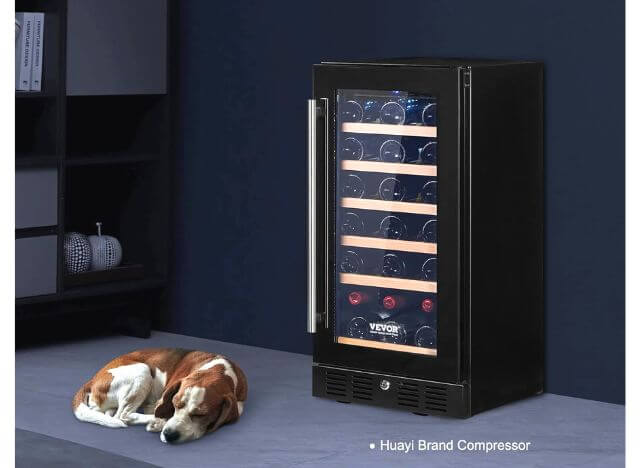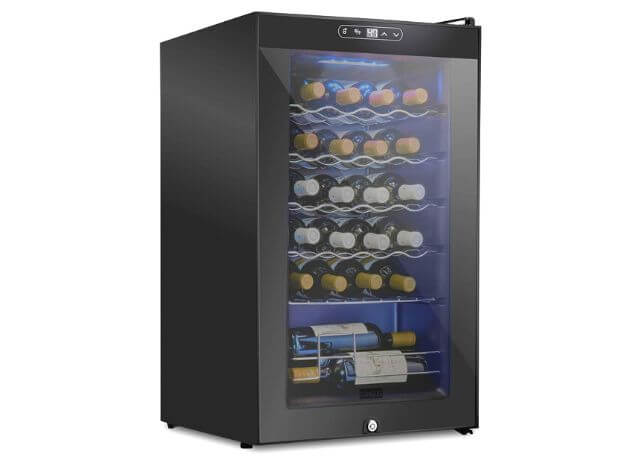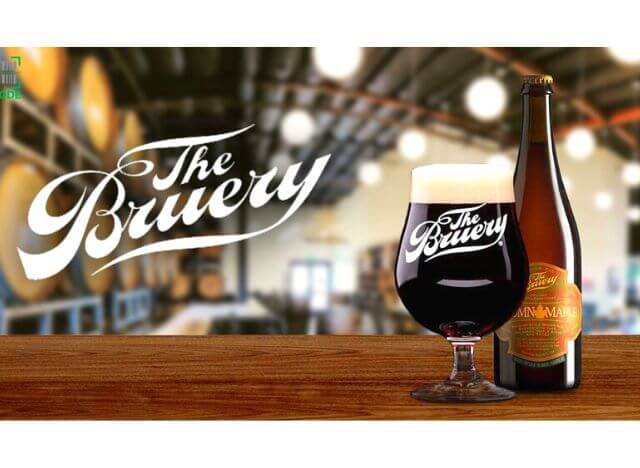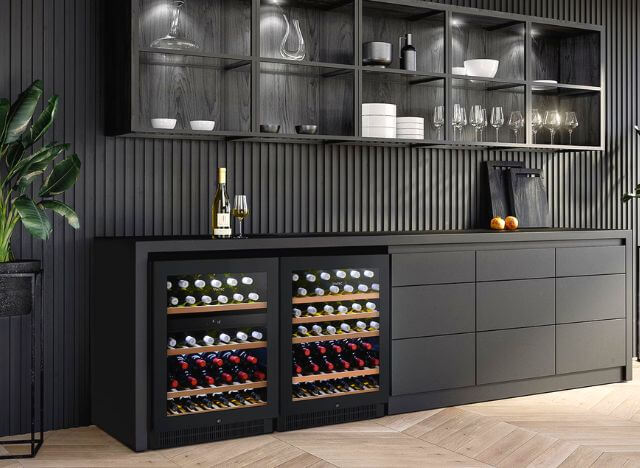You are a fan of soft drinks and beer. Like most people, you store wine, beer, and soft drinks in the fridge to help these foods taste better and last longer without being affected by outside temperatures.
However, you just received a wine refrigerator gift, making you wonder: Can a wine fridge be used for beer? The answer will be revealed in the next part of the article. Please scroll down and read carefully.
Can A Wine Fridge Be Used For Beer?
The short answer is yes. A wine fridge can be used for beer, making each gathering or party you throw from this point forward considerably better. As an overall guideline, beer may be refrigerated in a wine fridge to remain cool while retaining its initial flavor.
Beer needs an ideal temperature between 3° C and 13° C (37 to 55°F), and, interestingly, the majority of wines in wine fridges necessitate a temperate limit of 7-11° C (44 to 51° F), which corresponds to the suggested temperature level for beer preservation. Therefore, yes, beer might be stored in a wine fridge.

Storing beer in the wine fridge may be a clever way to employ refrigeration space when you want to maintain it distinct from the rest of the kitchen refrigerator or to guarantee it’s chilling properly.
First, you must know how to use a wine fridge to adjust the appropriate temperature for the best beer.
One of the key benefits of keeping and chilling beer in a wine fridge rather than the normal refrigerator is that a few of the stronger beers may be stored at higher temps.
Yet, this talent is useless for light beer. Since quickly reaching very high degrees causes the beer to appear flat or bland.
Further reading: Best Beer Fridge: Top 7 Fridges for Your Beer Collection
How Cold Does A Wine Fridge Get?
Not every one of the wine coolers is created equal. Several wine coolers have only one ambient temperature established, whereas other models have two. To cool alcohol, some utilize typical compressors that produce air, while others employ radiative cooling devices.
The temperature that wine fridges can reach fluctuates between 5°C and 18°C (41°F and 64°F). However, most wine fridges do not dip under 5°C since this degree is inappropriate for storing most wines.
However, the fact that your wine fridge can reach certain degrees does not imply your wine deserves to be maintained at those temperatures. Most wines need to be held somewhat warmer, at approximately 12°C (53°F).
The internal temperature in a wine fridge is significant, but the outside is also vital. The average temperature of the surroundings in which your wine fridge is positioned is referred to as the room temperature.
A wine fridge will operate when placed in an area with a consistent general temperature that fits an established range.

What Is The Best Temperature For Storing Beer In A Wine Fridge?
Temperature is always a very important factor in food preservation in general and wine preservation in particular. If the temperature in cold storage is too low, it will reduce the process of improving the quality of the wine. You need to note that the best temperatures for beers are various.
Strong Beer
Stronger beers should be stored in a cooler designed for wine because their ideal temperatures for preservation vary from 13°C to 16°C (55 to 60°F).

Wine refrigerators are best suited for stronger beers since they operate at temperatures higher than ambient.
Heavy ales in this fridge may be “extremely cold,” freezing the taste receptors. Consequently, it has a bland flavor. Strong beers should be stored in wine refrigerators ranging from 10°C to 13°C (50 to 55°F).
Standard Beer
Because of warm situations, standard beers may retain their flavor and aroma well in a wine refrigerator. They should be stored at 11°C to 13°C (52 to 55° F).
Light Beer

Light brews may also be kept in wine refrigerators, but because of their considerably lower desired storage conditions, it’s best to preserve them in conventional refrigerators. The temperature refrigerators are closer to the recommended temperature range of 4.5°C to 10°C (40 to 50°F ) than wine fridges.
Tips For You When Storing Beer In A Wine Fridge
Because it is not a specialized cabinet for storing beer, you need to be very careful during storage to avoid reducing the quality of the beer.
Beer’s flavor is created by microorganisms (mainly yeast), so even a small temperature change will affect its flavor. Therefore, you should always store your beer and soft drinks at the most stable temperature. Carefully verify the ambient temperature levels on the wine refrigerator.
Always check their shelf life, and it’s best to use them up before the expiration date is at least 1 month. It is best to use it all after opening it or within the same day.
FAQs
Is It Safe To Store Beer In A Wine Cooler?
Storing beer in a wine refrigerator is safe as the internal temperature is set right.
Remember that wine refrigerators are not expressly built for beer-keeping. Thus, the appropriate temperature might be altered to ensure the brew is held at the right temperature.
What Temperature Will Ruin Beer?
High levels of temperatures, however, can destroy beer. Any ale subjected to degrees over 21°C (69°F) for an extended duration can acquire a bitter flavor. Heat weakens the molecular connections that give beer flavor and may deteriorate and become unpalatable.
On the other hand, brewed at temperatures under 4°C (39°F) can get so frigid that it develops a sticky, sticky consistency, and the sensitive flavors of the ale are muffled.
Can Beer Go From Cold To Warm And Back to Cold?
Yes, it is possible. As long as the beer remains in its original container, temperature changes will have little or no effect on the freshness and flavor of the beer, especially if the beer is used within 6 weeks.
However, the refrigerator is still the best choice to preserve beer at optimal quality and taste. Storing for a long time at room temperature will shorten the shelf life of beer.
Conclusion
The answer to the question: “Can a wine fridge be used for beer?” is yes, so you do not need to be worried.
A wine fridge may be an excellent choice for keeping beer, as the interior temperature is properly controlled, and the storage space is sufficiently sized to accommodate the appropriate number of beers.

